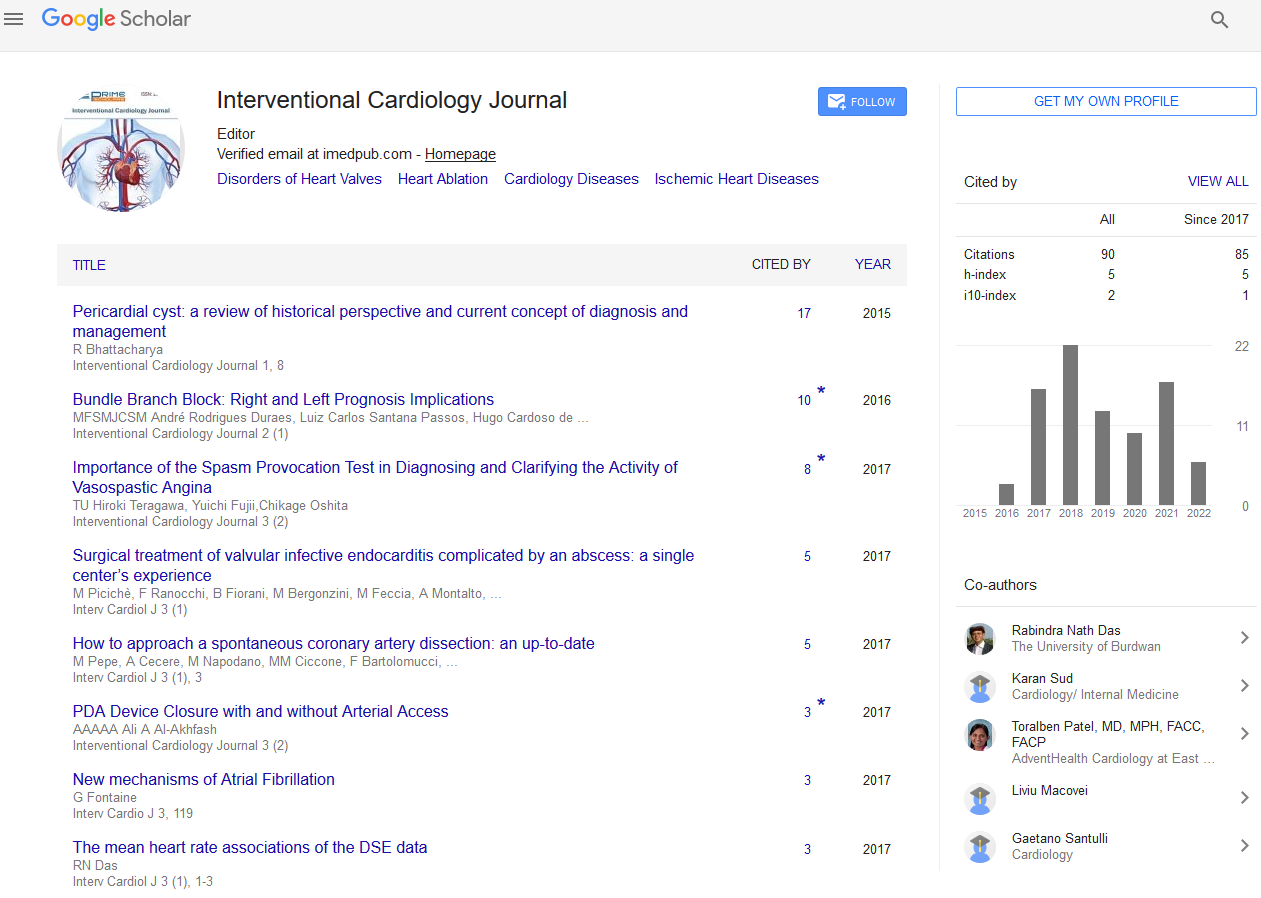Commentary - (2024) Volume 10, Issue 2
Transformative Impact of Wearable Technology: Monitoring and Managing Cardiovascular Health
Ralph Blake*
Department of Business Strategy and Innovation, Griffith University, Australia
*Correspondence:
Ralph Blake,
Department of Business Strategy and Innovation, Griffith University,
Australia,
Email:
Received: 31-Jan-2024, Manuscript No. IPIC-23-19070;
Editor assigned: 02-Feb-2024, Pre QC No. IPIC-23-19070 (PQ);
Reviewed: 16-Feb-2024, QC No. IPIC-23-19070;
Revised: 21-Feb-2024, Manuscript No. IPIC-23-19070 (R);
Published:
28-Feb-2024, DOI: 10.21767/2471-8157.10.02.16
Description
In an era where technology continues to redefine healthcare,
wearable devices have emerged as powerful tools for
monitoring and managing cardiovascular health. These
compact, user-friendly gadgets are equipped with sensors that
capture a wealth of physiological data, providing real-time
insights into various aspects of cardiovascular well-being. This
article explores the multifaceted role of wearable technology
in revolutionizing the way individuals monitor, understand, and
manage their cardiovascular health. Wearable technology has
undergone a remarkable evolution, transitioning from basic
activity trackers to sophisticated health monitoring devices.
The integration of advanced sensors, data analytics, and
connectivity has expanded the capabilities of wearables, making
them invaluable tools for proactive health management. In the
realm of cardiovascular health, wearables offer a continuous
and unobtrusive means of collecting vital information, ushering
in a new era of personalized and preventive care. One of the
primary contributions of wearable technology to cardiovascular
health is its ability to monitor vital signs in real time. Modern
wearables are equipped with sensors that track metrics such as
heart rate, blood pressure, and oxygen saturation. Continuous
monitoring of these vital signs provides a comprehensive
picture of cardiovascular health, allowing users and healthcare
professionals to identify irregularities, trends, and potential risk
factors. Electrocardiogram (ECG) monitoring, once confined
to clinical settings, is now available on wearable devices.
Wearables with built-in ECG capabilities enable users to record
and analyze their heart's electrical activity, offering insights into
rhythm irregularities such as atrial fibrillation. Early detection
of such conditions is crucial for timely intervention and can
significantly reduce the risk of complications, highlighting the
transformative potential of wearables in preventive cardiology.
Traditional Holter monitors, which record continuous ECG
over a 24 to 48-hour period, have limitations in terms of
patient comfort and detection of intermittent cardiac events.
Wearable devices equipped with extended ECG monitoring
capabilities address these limitations. They provide a longer
recording duration, facilitating the detection of sporadic
arrhythmias and capturing a more comprehensive snapshot of
the heart's electrical activity over an extended period. Quality
sleep is closely linked to cardiovascular health, and wearables
have evolved to include advanced sleep tracking features.
These devices monitor sleep patterns, duration, and quality,
offering users insights into their overall sleep hygiene. Regular
physical activity is a cornerstone of cardiovascular health, and
wearables play a pivotal role in promoting an active lifestyle.
Activity trackers and smartwatches monitor daily steps,
distance traveled, and calories burned, providing users with a
comprehensive overview of their physical activity. Some devices
also offer guided workout sessions, encouraging users to
engage in targeted exercises that benefit cardiovascular fitness.
The intricate connection between stress and cardiovascular
health is well-established. Wearables now include features to
monitor stress levels by analyzing Heart Rate Variability (HRV)
and providing insights into the body's response to stressors.
Integrating stress management tools into wearable technology
empowers users to adopt practices such as mindfulness and
relaxation techniques, contributing to overall mental wellbeing
and indirectly benefiting cardiovascular health. Wearable
technology has ushered in a new era of proactive cardiovascular
health management, allowing individuals to take an active role
in monitoring and improving their well-being.
Acknowledgement
None.
Conflict Of Interest
The author’s declared that they have no conflict of interest.
Citation: Blake R (2024) Transformative Impact of Wearable Technology: Monitoring and Managing Cardiovascular Health. Interv Cardiol J. 10:16.
Copyright: © 2024 Blake R. This is an open-access article distributed under the terms of the Creative Commons Attribution License, which permits unrestricted use, distribution, and reproduction in any medium, provided the original author and source are credited.

